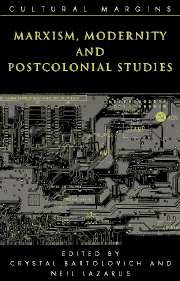Book contents
- Frontmatter
- Contents
- 1 Introduction: Marxism, modernity and postcolonial studies
- Part I Eurocentrism, “the West,” and the world
- Part II Locating modernity
- 6 Misplaced ideas? Locating and dislocating Ireland in colonial and postcolonial studies
- 7 Liberation theory: variations on themes of Marxism and modernity
- 8 Sex, space and modernity in the work of Rashid Jahan, “Angareywali”
- 9 Was there a time before race? Capitalist modernity and the origins of racism
- Part III Marxism, postcolonial studies, and “theory”
- References
- Index
9 - Was there a time before race? Capitalist modernity and the origins of racism
Published online by Cambridge University Press: 22 September 2009
- Frontmatter
- Contents
- 1 Introduction: Marxism, modernity and postcolonial studies
- Part I Eurocentrism, “the West,” and the world
- Part II Locating modernity
- 6 Misplaced ideas? Locating and dislocating Ireland in colonial and postcolonial studies
- 7 Liberation theory: variations on themes of Marxism and modernity
- 8 Sex, space and modernity in the work of Rashid Jahan, “Angareywali”
- 9 Was there a time before race? Capitalist modernity and the origins of racism
- Part III Marxism, postcolonial studies, and “theory”
- References
- Index
Summary
Some of the most comprehensive recent histories of race confirm the link between racism – the systematic oppression of groups on the basis of supposedly biological, inherent qualities readable in external characteristics – and capitalism. Robin Blackburn's The Making of New World Slavery uses extensive, detailed research to reveal that racism is modern and traceable to a specific phase in capitalism's development: the institutionalization of racial slavery in the colonial Americas. Blackburn provides an important key to understanding the character of the link between capitalism, slavery and racism when he places the concept of modernity at the heart of his analysis. He writes of the plantation slavery of the New World:
Its development was associated with several of those processes which have been held to define modernity: the growth of instrumental rationality, the rise of national sentiment and the nation-state, racialized perceptions of identity, the spread of market relations and wage labor, the development of administrative bureaucracies and modern tax systems, the growing sophistication of commerce and communication, the birth of consumer societies, the publication of newspapers and the beginnings of press advertising, “action at a distance”and an individualist sensibility.
(1997: 4)These “processes” develop over several centuries and only reach maturity with capitalism's hegemony. Because of its transitional nature – no longer clearly feudal, not yet fully capitalist – the early modern period provides particularly rich fodder for investigating the emergence of structures and ideologies associated with capitalist modernity.
- Type
- Chapter
- Information
- Marxism, Modernity and Postcolonial Studies , pp. 167 - 182Publisher: Cambridge University PressPrint publication year: 2002
- 3
- Cited by



